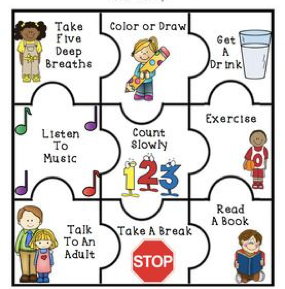Parenting Anxious Kids in the Coronavirus Era: Tips for Identifying & Coping With Anxiety

As a parent, you might be noticing an increase in emotional and behavioral concerns within your child during this corona virus outbreak, but also feel unsure of what you are observing. Below we will provide you with some specific tips on how to identify symptoms of anxiety in your child and some simple strategies on how to manage/prevent anxiety.
How can you tell if your child is feeling anxious?
Anxiety does not always present itself in children the way we would expect to see it, and it often looks differently than anxiety we observe in adults. Some symptoms can be the same, such as the physiological symptoms that accompany anxiety (e.g., headaches, stomachaches, shortness of breath, increased heart rate), as well as avoidance of certain activities that trigger anxiety (e.g., calling out of work, school refusal, avoiding social situations, etc.).
However, anxious children can often exhibit anxiety in ways that at first glance can be perceived as them being “difficult” or “defiant,” such as an increase in the following behaviors:
- Fussiness
- Irritability
- Tantrums
- Rigidity
- Asking lots of questions or seeking reassurance

Despite the appearance of these behaviors, allow yourself to question and analyze the behaviors further to better assess what may be going on and then determine a plan of action for how to target them.
An example of this recently came up at a talk with parents of preschool-aged children. They expressed concerns over their child’s refusal to join the school’s online video classrooms, wondering if this could this be an issue of defiance/non-compliance, or perhaps some other issue. Upon further assessment, it turned out the child was not just being stubborn or difficult, but felt worried or unsure of what this new way of interacting with others.
When anxious, children may also display regressed behaviors that they likely displayed during younger developmental stages such as:
- Toileting accidents
- Self-soothing behaviors (e.g., thumb sucking)
- Clinginess
- Demanding attention
While these regressive behaviors can be very confusing, concerning, and/or upsetting to you, know that they may be occurring due to anxiety, and that with some support these behaviors can once again diminish. Regardless of how your child is exhibiting anxiety, the underlying message is the same for all of the discussed behaviors—your child is trying to communicate that they are feeling stressed, anxious, or upset about something and they need your help in managing it.
It’s important to understand this, as being aware of the underlying cause of your child’s behaviors allows you to remain patient with them and to respond in a manner that will be helpful rather than exacerbate the problem. If you’re struggling to determine whether your child is experiencing a significant level of anxiety, reach out to the many mental health providers who are continuing to provide services during this stressful time for all.
How can you help manage anxiety in children?
- Help children identify and label their feelings. Provide opportunities for them to discuss how they feel by asking them about their feelings. If it seems they may not know what they feel, help them by describing common emotions (e.g., sad, scared, angry, anxious, confused), and providing examples of when one may feel a certain way. Younger kids often do not yet have the vocabulary or ability to verbalize their emotions. In this case, parents can label the emotion they are observing in their child for them to help by stating it aloud (e.g., “It seem like you’re feeling worried). This will teach them to identify, understand, and process their feelings. Drawing may also be a non-verbal way to help them talk about and process their feelings.
- Validate, validate, validate! Don’t dismiss feelings when expressed. It’s important to acknowledge what your child is experiencing and let them know that their feelings are valid and normal given the circumstances and changes we are all facing. Children can gain support in knowing they are not alone in how they feel. Having feelings is normal and okay – it’s what we do with those feelings (or how we manage them) that really matters!
- Highlight Strengths. Build confidence and security for them in knowing they can get through anxiety provoking situations by noting their strengths (e.g., brave, strong, patient).
- Promote positive thinking. Encourage positive thinking practices by providing a sense of hope for them that doctors and scientists are working hard to keep us safe, and highlight that this situation is temporary.
- Help them focus on what they can control versus what they can’t. Anxiety can rise when we get stuck on wanting to control things or wanting to change things we have no control over. Therefore, explain to children that while they cannot find a cure to the virus or make it go away, they do have control over how they react to things (e.g., by staying calm and hopeful) and in their day to day behaviors to keep themselves safe (e.g., washing hands thoroughly, social distancing practices, taking care of our bodies by eating and getting enough sleep).
- Practice relaxation strategies. Use of strategies such as deep breathing (decreases shallow breathing), hugging a pillow super tight and then letting go (decreases muscle tension), and imagining a relaxing/happy place of their choice (e.g., a place they want to travel in their mind or when the quarantine is over; or a place that they have good memories from) can support a more relaxed mental state. Engage them in calming activities (e.g., reading, arts/crafts, going for a walk) that increase calmness and relaxation and provide opportunities to release tension. Also set a stress-reducing environment in the home (e.g., quiet time, clearing clutter, or calming music) to enhance their calmness.

What are some preventative strategies that can help?
- Create stability/predictability by maintaining routines. During these times of uncertainty and lack of structure, it’s important to create and maintain schedules and routines. This structure will provide a sense of predictability and security, which is important in preventing or managing anxiety. While we are all adapting to changes, children especially may struggle with adjusting to these changes as they may be feeling confused. For example, they may not fully understand why we are being told to stay home, and this may feel more like being on vacation, yet they are still being expected to attend school or complete assignments online. Therefore, it’s especially important to create daily routines for them with clear expectations of what their morning, mid-day, and evenings will look like. This will also help them to re-adjust back into normal routines once the quarantine is over. This is also an opportunity to help them expand on other activities they can do to combat feelings of boredom, and to reduce kids consistently gravitating towards video games or T.V. time. When not engaging in academic work, create options for individual activities they can engage in and fun family activities (i.e. board games, cooking together, watching movies together).
- Staying physically active. Don’t forget the importance of keeping active and exercising for good physical and mental health, even if it is mostly within the home environment. Being at home in quarantine may feel as if you are restricted to sedentary activities, but you can create opportunities for more movement and physical exercise, it just may require more planning. Some options may be engaging in backyard games (e.g., basketball, hula hooping, jump roping), going on walks/runs or bike riding, or doing indoor movement activities (e.g., dancing, stretching, yoga for kids https://www.cosmickids.com/how-to-teach-yoga-to-toddlers-and-preschoolers/).
- Make yourself available to answer questions. Ask if they have questions. Be welcoming when they come to you with questions. Answer their questions with age appropriate information and limiting unnecessary information/overly specific details.
Please contact us for further consultation about your child or children dealing with anxiety during the COVID-19 pandemic.


Brittany Beyerlein, Ph.D. and Julissa Cortes, Psy.D. practice at CBT SoCal, and specialize in treating children and teens struggling with emotional and behavioral difficulties in Torrance and Glendale, CA.
